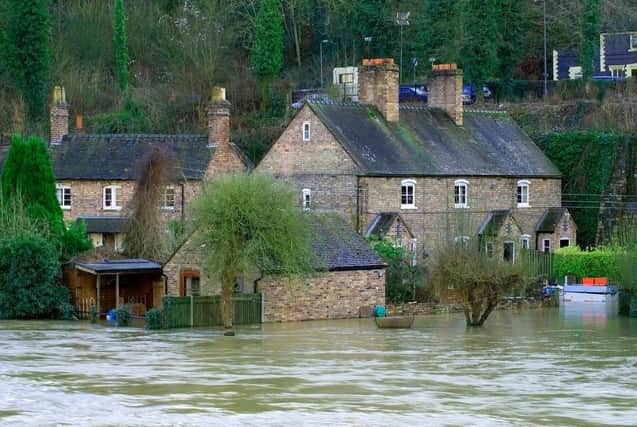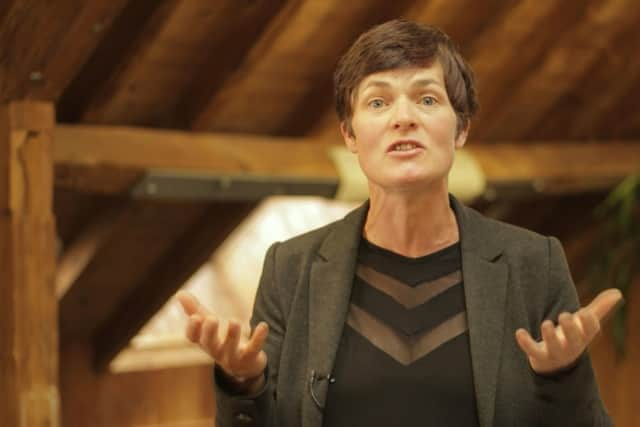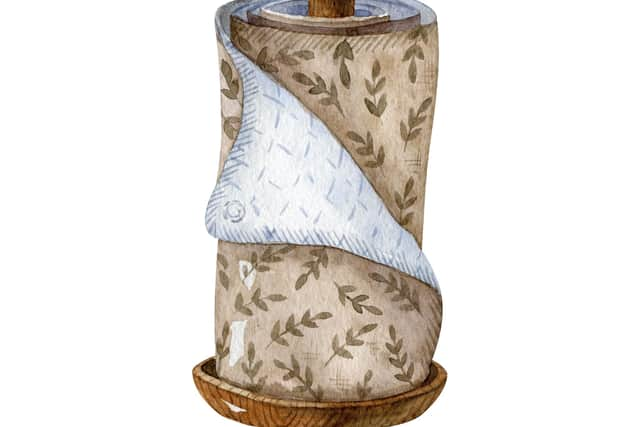Warning of risk of flooding for homes next to waterways


Unless you live at the top of a very big hill, there’s a risk you could be in one of the 5.2 million homes across the UK that are at risk of flooding.
That’s one in six houses according to information from the Environment Agency.
Advertisement
Hide AdAdvertisement
Hide AdJust recently we saw the River Thames dangerously close to celebrity homes including the homes of Russell Brand and Ricky Gervais, but it is not only those with expensive seven figure homes or houses that back onto waterways that are at risk, there are others.


There are 2.4 million properties are at risk of flooding from rivers or the sea, one million of those properties are also at risk of surface water flooding and a further 2.8 million properties are at risk of surface water flooding alone.
With increasing frequency, it seems we see flooding headlines in the newspapers and on TV and we’re no strangers to seeing footage of dingy’s in high streets when the worst of the winter flooding hits – usually around this time of year.
The good news is though, there’s a lot you can do to reduce your risk and be alerted in time to take action.
Advertisement
Hide AdAdvertisement
Hide AdFirstly, if you’re concerned, the government have a flood alert system you can sign up by visiting the www.gov.uk/sign-up-for-flood-warnings website.


Next, make sure your insurance is watertight – pun intended.
Make sure it covers you for all types of flooding, these include: River, coastal, surface water, sewer and ground water flooding.
The last occurs when the water table – all the water in the ground – rises and floods from underneath properties.
Advertisement
Hide AdAdvertisement
Hide AdThis last one can be hard to find but if you’re concerned it could happen shop around.


More properties than ever are being built on land susceptible to this type of flooding so do your homework.
If you’ve been alerted and your insurance is in place, but a flood is imminent, Floodline advisors can help you stay safe and they can be contacted on 0345 988 1188.
Make sure you move anything you can out of the way of the water, but only if it’s safe.
Advertisement
Hide AdAdvertisement
Hide AdIf you can’t move furniture on your own, don’t try to. Make sure you still have a safe way out of your property too.
Take photographs around your home which might help retrospectively with insurance claims too.
You may be evacuated but if you’re not or if you choose to stay turn off all power and make sure you have plenty of food you can eat without needing power to cook it.
Make sure you have a ‘go to’ list of important numbers, these could include your flood insurance provider, utility companies and friends and family who may be able to help.
Advertisement
Hide AdAdvertisement
Hide AdThere’s no doubt that flooding in the UK is becoming more commonplace but with proper foresight and planning it doesn’t have to be totally devastating.
Celebrity spot
Holding the world record for the fastest solo circumnavigation of the globe, international yachtswoman and sailor Dame Ellen Macarthur is an advocate of reducing single use: “The world’s current take-make-dispose linear economy is outdated. It is also the root cause of some of today’s most challenging problems.
Planet Earth faces a waste plastic crisis that no amount of well-intentioned clean-ups can solve. The answer lies in the creation of a circular economy. We need to move beyond a philosophy of single use.”
Green swap
Swap kitchen rolls for reusable rolls or tea towels. While kitchen towel is biodegradable, producing it is a very energy intensive process and, while it can be composted, not all councils recycle it. Reusable kitchen towels can be bought for under £10.
Why Cupid’s arrow need not cost us the earth!
Advertisement
Hide AdAdvertisement
Hide AdIt’s that time of year when Cupid comes along and love is very much on the menu ... but at what cost to our environment?
We’re aware of being eco friendly at Christmas with recyclable wrapping paper and living trees but just how green can St Valentine be?
As it turns out, we could all be doing a lot more to love the environment and also to love the planet.
And, as much as we might love our other halves and St Valentine's Day, it is a perfect starting point to think about where your gifts are coming from and what they are doing to the climate and to the environment.
Advertisement
Hide AdAdvertisement
Hide AdA staggering 55 million cut roses will be bought around the world with each stem requiring as much as ten litres of fresh water to reach its full size.
Royal Mail will deliver 12 million cards in the UK and an estimated £670 million will be spent on gifts.
The good news for all of us is that there are lots of different ways to have a day of love while not increasing your carbon footprint.
Roses will eventually wither and die but for £20, the same price as a bunch of flowers, you can dedicate a tree to a loved one that could last for centuries.
Advertisement
Hide AdAdvertisement
Hide AdVisit www.woodlandtrust.org.uk/support-us/give/dedications website.
If your budget is a big one and you’re thinking of popping the question this Valentine’s Day go for a vintage antique ring instead of a new one.
Not only can antique rings accrue value but your betrothed is guaranteed to have something individual rather than risking having the same engagement ring as someone else.
If you’re eating out, consider food miles and go for somewhere that puts local produce at the front and centre of its menu planning, better still cook your own and shop locally.
If you’re set on chocolate make sure it’s fair trade.
Advertisement
Hide AdAdvertisement
Hide AdLots of card companies are doing plantable cards that are made with wildflower seeds in them.
So once your loved one has enjoyed the missives of love, they can plant their card and enjoy the wild flowers and the nature they're sure to bring every season for years to come.
It's worth remembering too that we don't have to spend a fortune.
We're all in a cost of living crisis so spending can and should reflect that.
Advertisement
Hide AdAdvertisement
Hide AdSo, if budgets are tight too, remember love is as much about the small gestures as it is the grand ones.
Try running a bath, bringing a cup of tea in bed or giving a back rub.
These are all perfect ways to demonstrate love without spending a penny.
Valentine’s Day doesn’t have to be about money ... and it certainly doesn’t have to cost the earth!
Fact or fiction
Advertisement
Hide AdAdvertisement
Hide AdCows require 28 times more grazing compared to pigs or chickens. Globally cattle ranches deforest parts of the globe at an unsustainable rate with cattle ranching accounting for 80 per cent of Amazon rainforest deforestation.